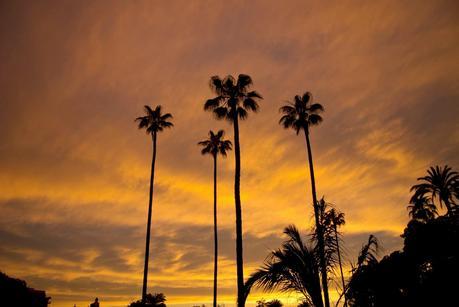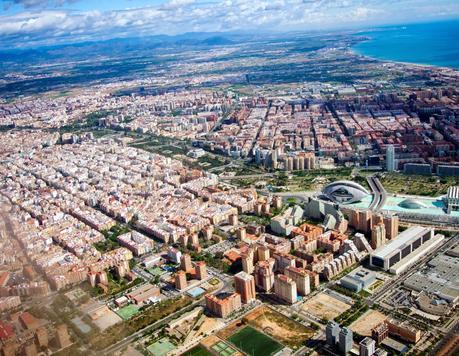
Valencia from above: Volando voy, volando vengo, vengo!
It's my blog's 3-year anniversary! I made it. I made it to three years! Who would have predicted that? It all started in September of 2011. A year passed, and I was still going. But by last year's birthday, life had caught up with me, and since then I've been barely managing my modest personal goal of one post per month. Which brings me to the big news... I'M GOING TO SOUTH KOREA!!!As you read this, I am already there (here?) settling into my new home for 2014-2015 in Daejeon, South Korea. For the last few months I've been reading up on my host country, taking private Korean language classes (the modern Korean alphabet has an amazing history, invited in the 15th century to improve literacy!), and getting involved with the Asociación Hangul Hakyo Valencia... Yes, there is a South Korean cultural association in Valencia! Who knew!?!
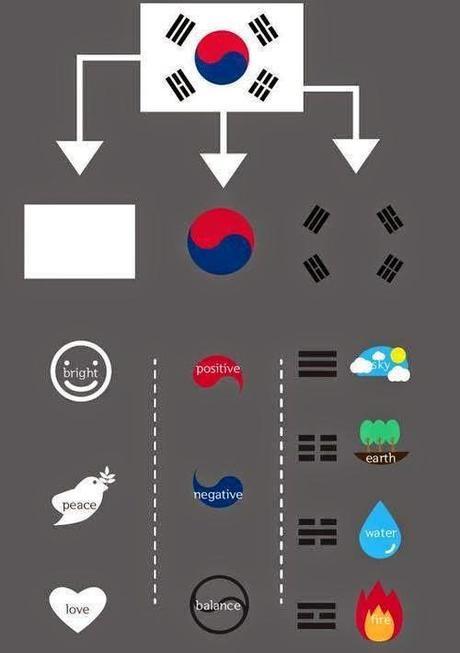
I'd wager that the most famous (even iconic) Korean thing is its flag, the 'Tae-guk'.
But you probably didn't know all the complex symbolism behind it,
not just the yen and the yang, but also Daoist principles encoded in the four trigrams.
 Now, don't take it personally,
Now, don't take it personally, So I wanted to take this opportunity to say so long and thanks for all the fish, and to direct any new passerbyers to my blog to these five highlights from the blog on Valencia and Spain, which should hopefully be relevant and useful to you over the next year while I'm away...
(1) Valencia, the Land of Flowers, Light, and of Love (1)
For those of you coming to Valencia with questions about what to do and where to stay, I direct you to this page I created, "Valencia and Fallas in a Nutshell", which lists links to all the blog entries I've written about my beloved adopted city. You might also want to "Like" my Facebook Page, where I post or repost stories related to Valencia and Spain, and where you can see my many photos posted over the last year. It is an amazing city. Many of you have written emails to me about Valencia, often with the same
FAQs:
• If I'm in Spain for only a short time, would you recommend I visit Valencia? And for how long?
Yes! You will love it here. I'd recommend 2 days at the bare minimum. (I don't know how these cruise ships visitors do it.) 3-5 days is probably the ideal length of stay... Or a lifetime should you happen to fall in love with it. (Oh, and please consider Valencia during Fallas to be an entirely different visit. You have to see the city outside of Fallas, too.)
• If I want to learn Spanish, is Valencia a good place to do so?
It is a great place to learn Spanish! While you will see and hear Valencian (i.e. a dialect of Catalan), Spanish is the most commonly spoken language in the city, and everyone speaks it and is happy to speak it with you.
• What neighborhood(s) should I look at to live in?
I tend to recommend that newbies look in the city center (esp. El Carmen, but also Sant Francesc if you can afford it), Russafa, or Benimaclet, depending on their spending money, tolerance of noise/excitement, etc. For a more fine-honed recommendation, take a look at this neighborhood map:
http://commons.wikimedia.org/wiki/File:Valencia-Barris-Clau-Sant_Francesc.png
Be aware that parts of El Mercat, with its infamous “barrio chino”, 2-3 streets of prostitution (an area labeled “Velluters” on some maps), is a rough exception. (On the other hand, if you avoid those 2-3 streets, El Mercat, particularly on the big avenues, is also a nice area.) Oh, and I'd avoid living near the Valencia city beach (a.k.a. Cabanyal) no matter how much you love fun in the sun – it's a bit dodgy at night and is far from the city center and most other attractions.
• How can I get a job teaching English in Valencia/Spain?
My road to teaching English was so unconventional, that I hesitate to give advice on this. Still, a word or two of advice, since people keep asking me about it. First, the two most desirable things employers are looking for, other than being a native speaker, are: 1) a university degree (preferably in English, though I didn't have it), and 2) classroom teaching experience (of any kind... it is no small skill to know how to stand in front of people and act confident and capable). After that, the next two useful things to have are 1) some kind of English teaching certification (this is usually a must for teaching primary or secondary school in Spain, though not so important for teaching in the private academies), and 2) a willingness to teach kids (who are often the largest and most consistent student base for most academies).
Oh, and here's the usual rub: for some academies (like mine) you will need a work visa, they won't sponsor it; and for the others that are willing to hire you 'sin papeles' be ready to be treated poorly, at least in terms that you won't have social security and the pay might not be great. Of course, that's just the sober reality. The good news is that the economic crisis has been a boon for English teaching, thank you Ana Botella, so there is employment for you here somewhere. But be prepared for chronic underemployment and only part-time income at first.
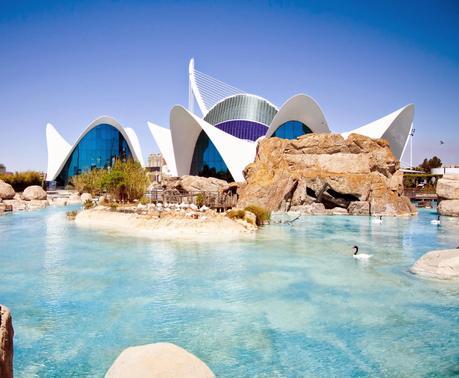
(2) Fallas, a City on Fire (2)
This year I had the privilege of going behind-the-scenes on Fallas, Valencia's main festival of fire and light. There is a lot going on in this festival – before, during, and after. Skip the bull about San Fermín and learn more about Valencia as a burns with unrivaled passion in its springtime, mid-March festival. I've written a lot about it, but here are the main stories:
• My general page on "Valencia and Fallas in a Nutshell"
• For my most polished, professional publication on Fallas, see this article on the festival's three main industries – pirotecnia, indumentaria, and artistas falleros.
• For a more lived narrative of Fallas, review my 2012 Hangover and 2014 Hangover posts
• And my interview of famed artista fallero Manolo García
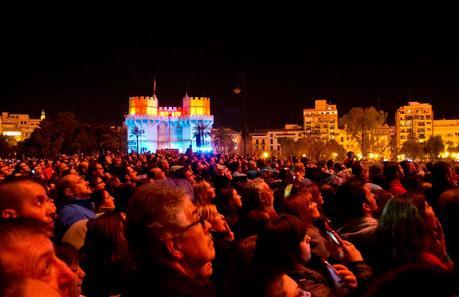
(3) Teaching English as a Foreign Language, a.k.a. TEFL (3)
I've spent the last few years teaching English to Spaniards. I love teaching and pedagogy, and the result is that over the years I've come up with a bunch of activities, handouts, and guides —25 in total— for how to teach different English concepts or vocabulary sets to non-native speakers. A lot of work went into making these, I found them incredibly helpful, and I want all you current and future TEFL teachers out there to profit from that labor of love. So please check out these four blog entries (including links to additional outside resources), and please
• "Teaching English as a Second Language: Ten Ready-Made Lessons" – 1) Tongue-twisters, 2) "The History of the English Language in 10-minutes", 3) Dictation exercises, 4) Christmas handouts, 5) The Amazing Verb To Get, 6) Baseball idioms, 7) Latin and Greek expressions in English, 8) grammar of "to be" and "to get", 9) "English Pronunciation" poem, 10) "In the Jungle" kid's handout
• "Teaching English as a Second Language, part 2: Five (More) Ready-made Lessons" – 11) Family Vocab, 12) Personality Vocab, 13) Thanksgiving handouts, 14) Cinema handout, 15) Learning the language through English language songs
• "Teaching English as a Second Language, pt. 3: Five More Ready-made Lessons" – 16) cooking, 17) Kid's ESL games, 18) Kid's travel/geography, 19) Conditional tense practice, 20) Speaking test tips
• "Teaching English as a Second Language, pt. 4: Five Final Ready-Made Lessons" – 21) Cursing, 22) 10 Common FCE Mistakes + Saxon Genitive, 23) New Kid's Xmas handout, 24) Adjective Word Order handout, 25) How to conjugate every verb in the English language
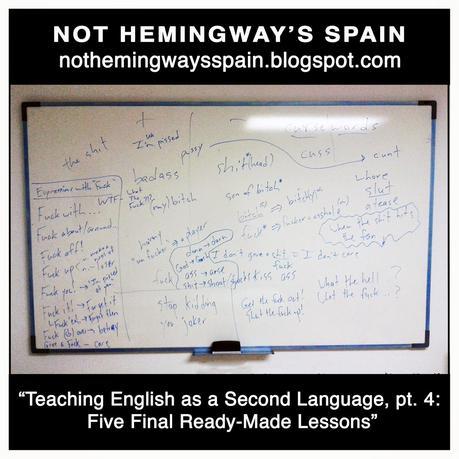
A photo of the blackboard from one of my classes on English curse words.
(3) Spain, the Land of Excellent
Did you know that after Switzerland, Spain is the European country with the greatest percent of land that is mountainous? No? Well, neither do most Spaniards. And until recently 'la marca España' was so focused on selling its beautiful beaches
• "La Alberca and the Sierra de Francia"
• "Valle de Tena and Towns in the Spanish Pyrenees"
• "Spanish National Parks: "Parque Nacional de Ordesa," A Natural Treasure in the Spanish Pyrenees"
• "Linares de Mora and the Sierra de Gúdar"
Don't get me wrong. Spaniards have long loved their "casas rurales", "pueblos con encanto", and there has certainly long been a tradition of hiking the 'Camino de Santiago'. But it's only really been in the last 20 years that trail maintenance has improved in many of Spain's previously unnoticed sierras, and hiking is starting to become a real industry here. For this reason, even though it is not a central focus of the blog, I'm highlighting Spain's hiking tourism here, to encourage you all to add it to your list of must-dos when visiting.
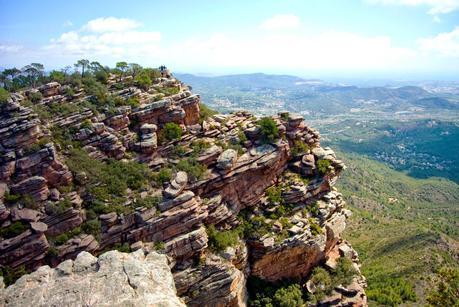
One never needs to travel far in Spain for beautiful mountain views.
El Garbí, seen here, is a classic hiking day trip from Valencia.
(5) My publications page (5)
Being one of the few English-language bloggers in Valencia with stay power (that is, here for more than a year-long study abroad), I've occassionally been invited to write articles and publish photos for various online venues. This spring I created a page where I list them:
"My publications"
Highlights would include my year-long photo collaboration with 24/7 Valencia, regular guests posts for The Spain Scoop, reposts by Expatica.com, and the article on Fallas that I got published in Roads & Kingdoms. I encourage you to check it out, read them, tell your friends about them, etc. Really, folks, I make no money off this, so the only payment you can provide me are your kind words in the comments below
Don't worry Valencia! I love you! You are my home! I will be back, I promise!
